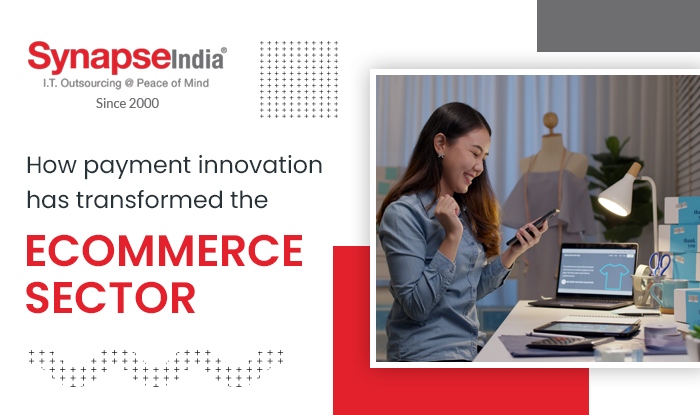 24 Aug 2022
24 Aug 2022“Payment innovation is causing companies to transform the way they operate their payment strategies. Read on to know how payment innovation has transformed the eCommerce sector.”

When it comes to the query, how global payment transformed the eCommerce sector? So, payment innovation has had a tectonic shift! The technology used when making payments is secure and quite complex. However, we will understand all the technologies and trends in payment innovation to unlock the full potential of eCommerce business growth. Also, the role of an ecommerce software development company in promoting the growth of online payments cannot be ignored.When it comes to the query, how global payment transformed the eCommerce sector? So, payment innovation has had a tectonic shift! The technology used when making payments is secure and quite complex. However, we will understand all the technologies and trends in payment innovation to unlock the full potential of eCommerce business growth. Also, the role of an ecommerce software development company in promoting the growth of online payments cannot be ignored.
In the last few decades, payment experiences have evolved dramatically. Improved technology, consumer convenience, safety precautions and legislation have all contributed to a change in the way we pay for products and services. Also, technology keeps advancing and all these changes affect global e-commerce and the way it works.
So, today in this blog, we will discuss the same how payment innovation has revolutionized the eCommerce sector.
Here, we will disclose the reasons why does the eCommerce sector should partner with Fintech B2B payments.
What is the most important thing in every business, including e-commerce? Of course, it is income. And the lower the expenses, the higher the profit.
It goes without saying that every online business needs a bank account to process transactions and collect payments. However, when it comes to all the traditional banks that allow merchants to trade money digitally, the process is accompanied by many fees. In fact, this is something of a no-brainer, as traditional banks have an extensive infrastructure with countless bank branches that need to cover their own costs.
As a result, classic business bank accounts typically come with multiple maintenance fees, minimum balance requirements, and transaction limits that, if not met, lead to more expenses.
In this way, Fintech can become a fantastic alternative for online-only businesses, as they do not impose substantial additional costs like banks. Plus, with the same set of offerings including digital payments, online banking, cash pickups, etc., merchants can enjoy additional revenue with little to no fees.
Not surprisingly, due to fintech developments, many businesses are now able to offer 0% interest on online loans directly at checkout to allow consumers to make large purchases without limits. As a result, consumers can now spend money on things they wouldn't buy if they didn't have that option.
In this sense, another important aspect of the beneficial partnership with fintechs is linked to continuous innovation that allows providers to transform the way they run their business. Payment strategies and a broader range of payment options directly impact customer preferences and behavior, constantly pushing merchants to improve their shoppers' customer experience and to develop and test new offerings to remain profitable.
The only downside to continuous technological advances is that businesses can no longer pause as they must tirelessly do their best to make buying and selling convenient and reliable, maximize their sales, and outperform their competitors.
As online payment fraud is on the rise and cyber-attacks become more frequent and sophisticated, more and more brands and e-commerce marketplaces are focusing on better KYC compliance programs.
In the absence of significant security measures, electronic commerce has become one of the most tempting targets for unscrupulous people. So, it's no surprise that the industry is looking for new ways to increase cyber resiliency and protect its customers without sacrificing customer experience.
KYC verification, in turn, can help at a very early stage to collect and verify complete user information, from bank card numbers and addresses to Face ID and fingerprints. In this sense, fintech companies have a lot of room to act. They can facilitate KYC programs within their products and services, ease the eCommerce hurdle, and provide more complex protection, while making it an industry standard.
As per a leading software development company, the biggest mistakes sellers make is overthinking about supply chain disruptions. For the supply chain, FinTechs act as intermediaries to facilitate transactions between a company and its suppliers. They allow greater liquidity and less variability in the programming and disbursement of payments. It is essential to understand that companies that use modern digital tools to improve their supply chain are more likely to achieve resilience, agility, and sustainability.
In the e-commerce race that most can't afford to lose, many have started to diversify their supply chains to mitigate the financial fallout. Instead of assuming that there will be no interruptions in a supply chain, companies should consider other sources. With a plethora of cross-border services such as package consolidation, global fulfillment, and payment providers, sellers can start exploring international markets. Diversifying the supply chain with the right payment provider can help sellers deliver to the right customers at the right time.
Innovations in artificial intelligence and data analytics have also improved shopping security by enabling real-time fraud detection, making digital payment methods more viable for B2B transactions. For example, shopping platforms can analyze corporate shopping data to identify spending trends and the specific behavior of individual users. From there, AI technology can detect suspicious purchases in real time and businesses can quickly and easily confirm whether or not these transactions are valid.
Without real-time fraud detection, companies might be less willing to allow employees to use technologies like digital wallets. However, because AI and data analytics help businesses quickly identify fraud, they can be more confident in using digital payments and making e-commerce purchases, allowing them to reap the efficiency benefits that offer these areas.
The best thing about blockchain technology in the e-commerce space is that it is profitable for both merchants and consumers and can become a multi-purpose tool for various business needs, from money transactions and transfers to shipping and security.
Due to fintech advancements, blockchain can help track a supply chain, manage inventory, reduce costs, and much more. But more importantly, blockchain technology can become a fantastic solution for cyber-attacks and financial security concerns mentioned above as the technology offers multi-layered protection in the form of distributed ledgers.
Another advantage of the blockchain implementation is that all data is time-stamped, permanent, and open to the public, ensuring accuracy and transparency.
Finally, the blockchain ecosystem can open the doors for online retailers to use the new markets in developing countries, as consumers do not require an intermediary to process their payment requests.
The future of the payment industry will revolutionize not only the customer experience and payment methods, but also financial services in general. The sector has seen a significant infusion of additional non-bank players, including tech startups and tech giants, posing ever-increasing competition for banks.
Indeed, fintech entrepreneurs are reshaping the banking industry by capitalizing on trends such as the dominance of smartphones and mobile platforms, as well as changing customer expectations. Future payment technology organizations will need to adapt to these developments with new skills, products, and operating models to keep their customer connections relevant.
As we can see, FinTechs have transformed payment processing, customer experience, business strategies, and will undoubtedly continue to change everything around them in the coming years.
Overall, it's clear that fintech and eCommerce are a perfect match that will continue to revolutionize the online market, creating countless opportunities to grow and prosper.
Additionally, as the industry continues to evolve and innovate, and these innovations show it, fintech is transforming B2B digital payments and eCommerce for the better. Simply contact SynapseIndia today to find out how your business can use Fintech to improve business payment strategies.


